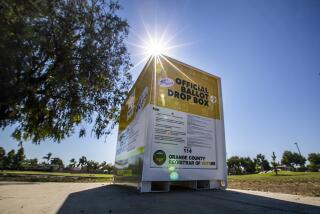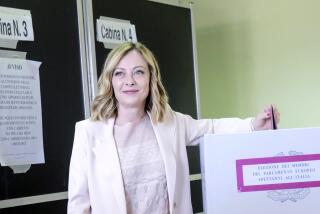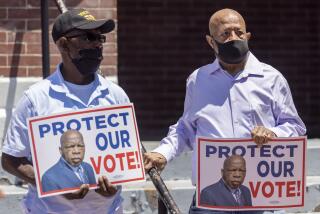Pall Precedes Elections in Divided Bosnian City
- Share via
MOSTAR, Bosnia-Herzegovina — The threats against Jozo Musa began about the time his opposition candidacy became known in this divided city. Traitor, the phone calls and letters branded him. Loudmouth. We will liquidate you, they said.
Musa, who is a Croat, figures his sin lies in representing a Muslim-Croat coalition in a part of Bosnia-Herzegovina where the lines of ethnic division run as deep as the Neretva River that splits this city into eastern (Muslim) and western (Croatian) sectors.
Local elections here Sunday are seen as a dry run for Bosnia’s crucial nationwide elections, scheduled for Sept. 14. The voting will test the strength of the notoriously weak governing Muslim-Croat federation and will provide the first sign of whether democracy and political tolerance can exist in postwar Bosnia.
The signs are not encouraging.
The potential for violence and the certainty of ethnic-based voting bode ill for attempts to bring Bosnia’s enemies back together.
Many residents of Mostar--especially Muslim men--still cannot venture into sections of the city controlled by ethnic rivals without the risk of being beaten. Minority Serbs have in practical terms been excluded from the vote--as have refugees living in this southwest Bosnian city. And an elaborate plan to bus in thousands of expelled Mostar residents on election day raises the specter of chaos.
As the predicament of Musa--who is on a slate of candidates for Mostar’s city council--illustrates, the violence is just as likely to occur among Croats, where hard-liners and black-market profiteers dedicated to ethnic segregation have little stomach for moderates.
The determination of these Croatian nationalists to continue to run a breakaway state known as Herceg-Bosna in western Bosnia poses a grave threat to the Muslim-Croat federation and to the U.S.-brokered peace agreement that ended the war six months ago. Earlier this month, Bosnian Croats named a slate of hard-liners to Herceg-Bosna “ministries,” including as their prime minister a former mayor of nearby Capljina implicated in the wartime detention of thousands of Muslims.
Under the peace agreement, Herceg-Bosna was supposed to disappear to clear the way for the federation, which was created by another U.S.-sponsored agreement in 1994 but has yet to overcome deep-seated animosities between Muslims and Croats, who fought heavily in 1993.
“Herceg-Bosna will exist, one way or another,” said a senior official of the European Union administration that oversees Mostar. “It will be a shadow structure, a government in waiting, because for the Croats, the federation is not the end product, it is interim. This is what the [Bosnian Muslims] fear most, and they are right.”
In fact, the federation remains so divided that a key defense law that would unify the two halves’ armies and allow a major U.S. equip-and-train program to begin has yet to be ratified, despite intense U.S. pressure, because Muslims and Croats can’t agree on who would command it.
The Mostar election will not resolve these issues, and some analysts think it will only institutionalize the ethnic divide.
Under a complex, negotiated set of rules, voting is primarily designed to fill ethnic quotas.
Nearly 100,000 people are eligible to vote for a city council that will be made up of 16 Croats, 16 Muslims and five “others.” The city council will then choose a single mayor for Mostar, which until now has had two mayors--one for Muslims, one for Croats.
The city is also being divided into six boroughs, and voters will elect a 25-seat parliament for each of the boroughs, with representation in each parliament based on the ethnic makeup of the area in the 1991 census. In practice, three boroughs will be majority Croatian and three will be majority Muslim.
Ricardo Perez Casado, the Spaniard who is the European Union’s administrator for Mostar, said the elections will help the reunification of the city by establishing a single mayor and city council. But most other observers disagree.
“There’s ‘ethnic cleansing,’ there’s ethnic partition, there’s no freedom of movement,” a veteran U.N. official said. “The election is only going to consolidate all that.”
Already delayed once, after Muslim politicians threatened a boycott, the election is governed by rules that seem to be more a product of shenanigans and connivance than of democratic spirit.
An opposition coalition was almost kept off the ballot when it missed a filing deadline that was not publicized, EU officials said. An independent ombudsman overruled the electoral commission and ordered the coalition onto the ballot, EU spokesman Dragan Gasic said.
Croatian and Muslim leaders who negotiated the election rules decided that all adults who resided in Mostar in 1991 could vote. But they also decided to exclude residents who came to Mostar after 1991, judging that most were refugees from rural areas and not “real Mostarians,” according to an internal U.N. report. U.N. and EU negotiators agreed to the provision, even though they recognized it was a violation of civil rights.
Muslims who initially accepted that there would be no absentee balloting balked at the last minute and refused to participate in the election, originally set for May.
In an agreement struck May 24 with the participation of U.S. Assistant Secretary of State John Kornblum, polling stations will be set up in Germany, Sweden, Norway and Switzerland for an estimated 17,000 Mostar voters living in those countries. The EU will also pay to bus in voters scattered all over the former Yugoslav federation; at least 10,000 are expected, and because most will be Muslim, there is concern that some of the buses may be attacked.
Up to 18,000 Serbs who lived in Mostar before the war, however, may not get to vote. A delegation representing the Serbs traveled to Mostar last week to demand that a polling station be set up in the Serbian and Yugoslav capital, Belgrade, where about 6,000 Serbs from Mostar live. The Belgrade government has refused to help with buses, delegation members said.
“If citizens can vote in Norway, why is it impossible to vote in Yugoslavia?” asked Radmilo Andric, 70, one of the Serbs and a former mayor of Mostar.
“It is beyond our understanding. We all fled for the same reasons . . . and now we are discriminated against.”
In a sign of how bad the relations are between Muslims and Croats, Safet Orucevic, the Muslim mayor of Mostar, is courting the Serbs as political allies.
Orucevic is apparently hoping that the five “others” to be elected to the city council will side with the Muslims in choosing Mostar’s future mayor.
Security at 77 polling stations will be provided by the Spanish Guardia Civil and the French gendarmes backing up unarmed U.N. police and local Muslim and Croatian police.
In a meeting earlier this year, the commander of North Atlantic Treaty Organization forces in Bosnia, U.S. Adm. Leighton W. Smith, refused Perez Casado’s request for assistance, according to a person who was present.
But under pressure, NATO--widely criticized for its timid response to most crises--has now agreed to help with security.
More to Read
Sign up for Essential California
The most important California stories and recommendations in your inbox every morning.
You may occasionally receive promotional content from the Los Angeles Times.














